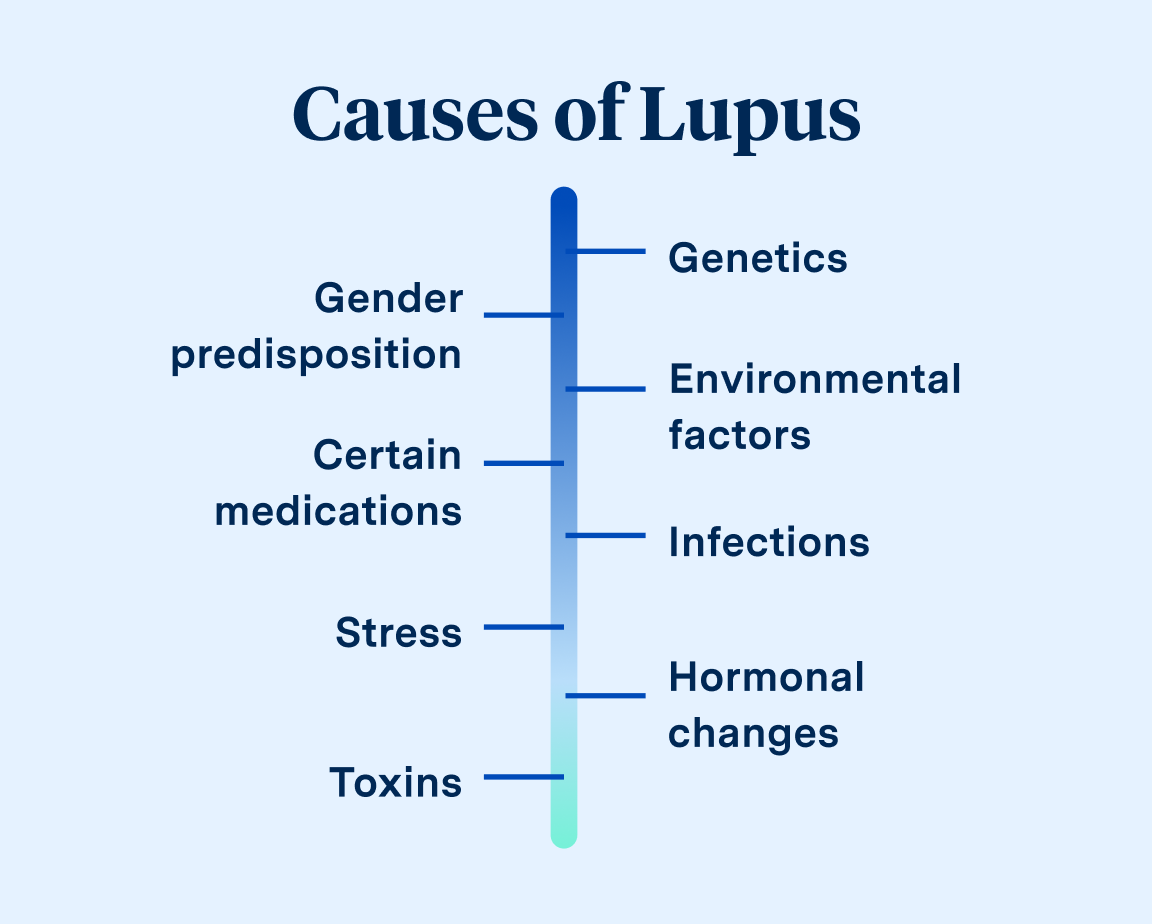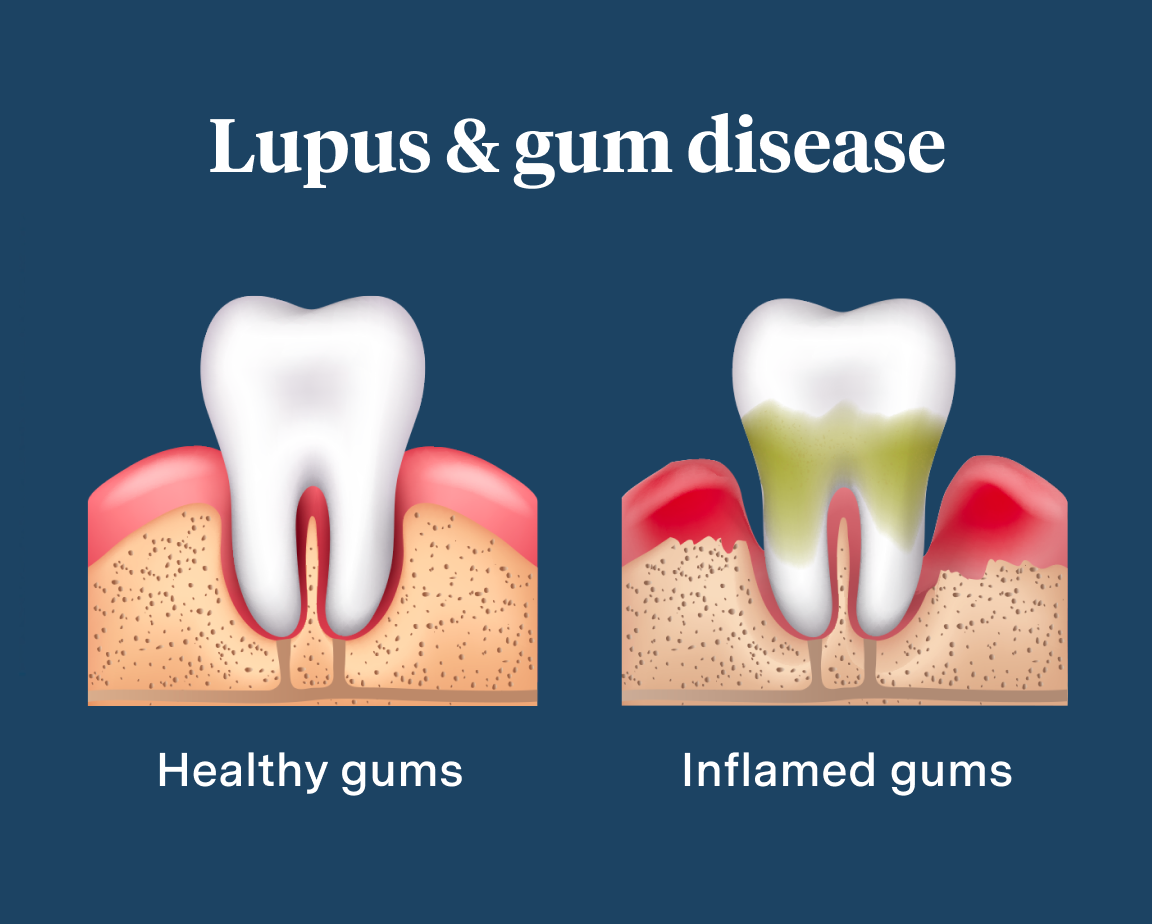Navigating oral health challenges with lupus
Discover how Lupus impacts oral health, from inflammation to gum disease, and learn effective strategies for oral care.
Living with lupus means being proactive about your health in every aspect, especially when it comes to oral care. At Aspen Dental, our goal is to equip you with the knowledge and support you need to manage your oral care effectively, ensuring you can maintain a healthy, radiant smile.
Understanding lupus
Lupus is a chronic autoimmune disease that occurs when your body's immune system mistakenly attacks its own tissues and organs, leading to widespread inflammation and a wide range of symptoms. This inflammation can impact various body systems, including joints, skin, vital organs, kidneys, blood cells and your oral health.

Causes of lupus
While the causes of lupus are not fully understood, researchers believe it's a combination of genetic and environmental factors that trigger the immune system's abnormal response, such as:
Genetics: Certain genes have been identified that may contribute to lupus susceptibility.
Gender predisposition: Females are more likely to develop lupus than males, suggesting that hormones like estrogen may play a role in triggering the disease.
Environmental Factors: Ultraviolet light exposure from sunlight can trigger lupus flares in some individuals.
Certain medications, such as hydralazine, procainamide, and quinidine, have been linked to drug-induced lupus.
Infections, particularly with the Epstein-Barr virus, may increase the risk of developing lupus in some cases.
Stress: Psychological stress has been associated with an increased risk of lupus flares and disease activity.
Hormonal Changes: Hormonal changes during pregnancy or after childbirth may contribute to the development or flare-up of lupus symptoms.
Toxins: Exposure to certain environmental toxins, such as silica dust, has been linked to an increased risk of lupus, particularly in those with a genetic predisposition.

Understanding how lupus affects oral health
Lupus and Sjogren's Syndrome
Many individuals with lupus may also experience Sjogren's Syndrome, an autoimmune disorder that frequently accompanies other immune system disorders. Sjogren's primarily affects your body's moisture-producing glands, leading to significant dry mouth, which can increase your risk for dental decay and gum disease. This condition can make it challenging to maintain proper oral hygiene and increase your susceptibility to oral infections.
Lupus medication effects on oral health
The medications prescribed to manage lupus, such as corticosteroids and immunosuppressants, can have side effects that directly impact the mouth. For instance, some of these medications may cause dry mouth or alter the balance of bacteria in the mouth, leading to an increased risk of cavities and oral infections. It's essential to be aware of these potential side effects and take proactive steps to mitigate.
Lupus and gum disease (gingivitis)
The chronic inflammation associated with lupus can contribute to gingivitis, which if left untreated may lead to periodontal disease or tooth loss. This bidirectional relationship between lupus and gum disease highlights the importance of maintaining excellent oral hygiene and seeking prompt treatment for any gum-related issues.

When to seek professional treatment for oral issues caused by lupus
It's essential to consult your healthcare provider and dental professionals if you experience persistent or severe symptoms such as mouth sores, gum inflammation, dry mouth, or any other oral health concerns. Early and proactive management is key to maintaining both oral and overall health while living with lupus.
Treatment for managing oral health issues caused by lupus
At Aspen Dental, we can help guide you and offer a treatment approach that can help you manage various oral issues that can arise from lupus.
Dry mouth management:
Saliva substitutes or artificial saliva products can help alleviate dry mouth symptoms and reduce the risk of tooth decay and gum disease.
Medications that stimulate saliva production, such as pilocarpine or cevimeline, may be prescribed in severe cases of dry mouth.
Frequent sips of water or sugar-free beverages can help keep the mouth moist and comfortable.
Gum disease treatment:
Regular professional dental cleanings are essential to remove plaque and tartar buildup, which can contribute to gum inflammation and disease.
Scaling and root planing procedures may be necessary to treat advanced gum disease and remove bacteria from deep periodontal pockets.
Antimicrobial mouthwashes or topical antibiotics may be prescribed to control bacterial growth and reduce gum inflammation.
Ask your Aspen Dental dentist about our medicated rinses and pastes, which provide therapeutic relief while protecting the minerals of your teeth.
Mouth sores and oral ulcer management:
Topical corticosteroid gels or mouth rinses can help alleviate pain and promote healing of oral ulcers or mouth sores.
Antimicrobial mouthwashes may be recommended to prevent secondary infections in severe cases.
Nutritional supplements, such as folic acid or vitamin B12, may be beneficial in some cases.
Oral Candidiasis treatment:
Antifungal medications, either in the form of oral tablets or topical gels or rinses, may be prescribed to treat oral thrush (candidiasis).
Good oral hygiene practices, including regular brushing and flossing, are essential to prevent the recurrence of oral candidiasis.
Dental restorations and prosthetics:
Fillings, crowns, or other restorative treatments may be necessary to repair tooth damage caused by dry mouth or gum disease.
Dental implants or dentures may be recommended in cases of severe tooth loss due to periodontitis or other oral complications.
Lifestyle modifications:
Quitting smoking and avoiding alcohol can help reduce the risk of oral health problems and promote overall wellness.
Maintaining a balanced diet and staying hydrated can support good oral health and overall disease management.
Stress management techniques, such as meditation or yoga, may help reduce inflammation and improve overall well-being.
Avoid mouthwashes with alcohol and whitening toothpaste as it can further irritate mouth.
Oral health and lupus FAQs
What are the symptoms of lupus in the mouth?
Some common oral symptoms associated with lupus include:
Dry mouth (xerostomia) due to decreased saliva production, which can increase the risk of tooth decay, gum disease, and oral infections.
Oral ulcers or sores, which are often painful and can make eating and speaking difficult.
Gum inflammation (gingivitis) and gum disease (periodontitis), which can lead to tooth loss if left untreated.
Oral candidiasis (thrush), a fungal infection that causes white or red patches in the mouth.
Difficulty swallowing or a feeling of having a lump in the throat due to inflammation.
Altered taste sensation or a metallic taste in the mouth.
Can bad oral health cause autoimmune disease?
Poor oral health alone is unlikely to cause an autoimmune disease, but it can be a contributing factor, especially in individuals with a genetic predisposition or other risk factors.
What other autoimmune diseases affects the mouth?
Several autoimmune diseases can affect the mouth and oral health, including:
Sjogren's Syndrome: This autoimmune disorder primarily affects the moisture-producing glands, including the salivary glands, leading to dry mouth and an increased risk of dental caries, gum disease, and oral infections.
Lupus: As discussed earlier, lupus can cause various oral manifestations, such as dry mouth, oral ulcers, gingivitis, and periodontitis.
Rheumatoid Arthritis (RA): RA can affect the temporomandibular joint (TMJ), causing pain, stiffness, and difficulty opening the mouth. It can also increase the risk of gum disease and tooth loss.
Pemphigus Vulgaris: This rare autoimmune disorder causes painful blisters and erosions in the mouth, making it difficult to eat, drink, and swallow.
Lichen Planus: An inflammatory condition that can cause white, lacy patches or red, swollen lesions in the mouth, sometimes accompanied by pain or burning sensations. Behcet's Disease: This condition can lead to recurrent, painful oral ulcers, as well as other symptoms affecting various body systems.

Our commitment to your care
At Aspen Dental, we recognize the connection between lupus and your oral health, as well as its impact on your overall well-being. That's why we believe in a collaborative approach, working hand-in-hand with both you and your medical doctors to manage symptoms and restore your smile.
Ready to take control of your oral health?
Our care team is here to answer your questions, address your concerns, and provide the guidance you need to maintain a healthy, radiant smile.
Schedule appointment >>

